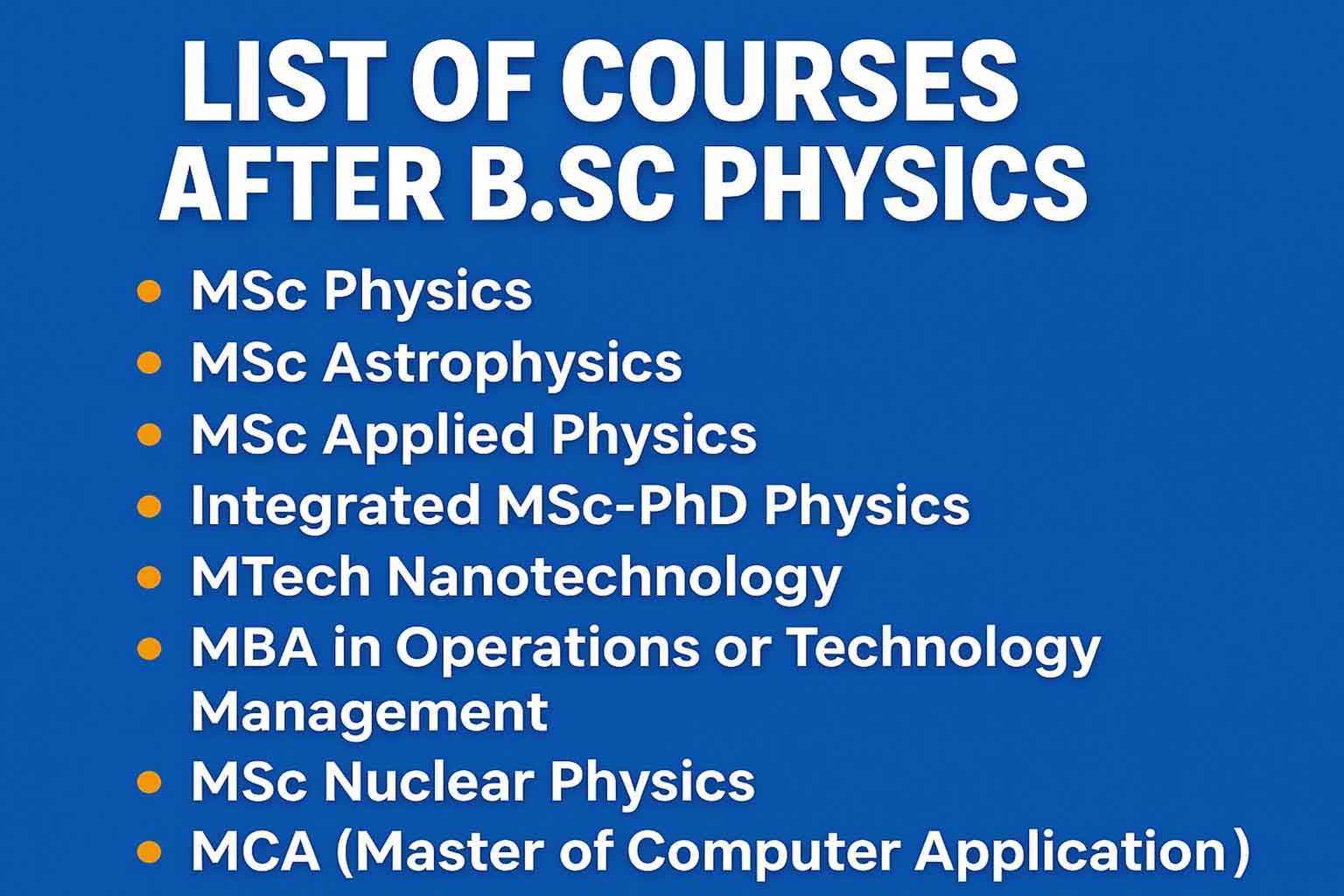Imagine standing at the edge of a vast universe of possibilities, your BSc in Physics degree in hand, ready to launch into exciting new orbits of knowledge and career success. If you’ve just completed your undergraduate studies in physics, you’re probably wondering about the next big step—exploring courses after BSc Physics that align with your passion for science, problem-solving, and innovation. Whether you’re drawn to cutting-edge research, high-tech industries, or even interdisciplinary fields, the world is full of opportunities waiting to be discovered.
Welcome to CoursesAfter.com, your friendly guide for students navigating the post-graduation landscape. We’re here to help you demystify your options with practical advice, real-world insights, and a touch of encouragement. Think of us as that supportive mentor who’s been through it all. In this comprehensive article, we’ll dive deep into the best courses after BSc Physics, from higher studies and diplomas to promising career paths. Let’s get started on charting your future!
After BSc Physics which courses is the best?
Completing a BSc in Physics equips you with a strong foundation in analytical thinking, mathematics, and experimental skills—tools that open doors to diverse fields. But with so many paths available, deciding on the best courses after BSc Physics can feel overwhelming. The “best” choice ultimately depends on your interests, career goals, and whether you prefer academia, industry, or entrepreneurship. For those passionate about pure science, advanced degrees like MSc Physics or PhD programs stand out as top picks, offering depth and research opportunities. If you’re eyeing lucrative tech roles, interdisciplinary options such as data science or engineering diplomas might be ideal.
From my experience talking to graduates, the most rewarding paths blend your physics background with emerging technologies like AI, renewable energy, or quantum computing. Popular entrance exams like GATE or JAM can unlock elite programs, while job-oriented certifications provide quick entry into the workforce. Ultimately, the best course is one that excites you and aligns with market demands—think high employability and growth potential. As we explore further, you’ll see how these options can lead to fulfilling careers with competitive salaries. Let’s break it down step by step.
List of Popular Courses After BSc Physics

Physics graduates have a wealth of options for higher studies, blending theoretical knowledge with practical applications. Based on trends in enrollment and job outcomes, here are 20 of the most popular courses after BSc Physics, ranked by popularity. Each one builds on your foundational skills, offering pathways to specialised expertise and rewarding careers.
MSc Physics
A program for physics enthusiasts, covering quantum mechanics, electromagnetism, and thermodynamics. Best suited for research or academia.
- Duration: 2 years
- Eligibility: BSc Physics with 50-60% marks; entrance exams like JAM or university tests
- Career Options: Research Scientist, Lecturer, Lab Manager
- Fees: ₹50,000 – ₹3,00,000
- Salary Range: ₹4-12 LPA
MSc Astrophysics
Explores celestial phenomena such as stars and galaxies, blending physics with astronomy. Ideal for careers in observatories and space agencies.
- Duration: 2 years
- Eligibility: BSc Physics/Maths; entrance via JAM or institute exams
- Career Options: Astronomer, Data Analyst in Space Tech, Academic Researcher
- Fees: ₹1,00,000 – ₹4,00,000
- Salary Range: ₹5-15 LPA
MSc Applied Physics
Emphasises real-world applications like optics and materials science. Suitable for industry roles bridging theory and technology.
- Duration: 2 years
- Eligibility: BSc Physics; merit or entrance-based
- Career Options: R&D Engineer, Quality Control Specialist, Consultant
- Fees: ₹60,000 – ₹2,50,000
- Salary Range: ₹4-10 LPA
Integrated MSc-PhD Physics
A 5-year combined program for dedicated researchers, merging master’s and doctoral studies. Designed for students aiming for a direct PhD path.
- Duration: 5 years
- Eligibility: BSc Physics; national exams like GATE/JAM
- Career Options: PhD Researcher, Professor, Scientific Advisor
- Fees: ₹1,00,000 – ₹5,00,000
- Salary Range: ₹6-18 LPA (post-PhD)
MTech Nanotechnology
Covers nanomaterials, quantum dots, and nanoscale innovations. Strong demand in biotechnology and electronics.
- Duration: 2 years
- Eligibility: BSc Physics + GATE; or BTech equivalent
- Career Options: Nanotech Engineer, Researcher in Pharma, Device Developer
- Fees: ₹1,50,000 – ₹4,00,000
- Salary Range: ₹7-14 LPA
MBA in Operations or Technology Management
Uses analytical skills for managerial roles in technology and operations. Perfect for leadership aspirations.
- Duration: 2 years
- Eligibility: BSc Physics + CAT/MAT scores; 50% aggregate
- Career Options: Project Manager, Operations Analyst, Business Consultant
- Fees: ₹5,00,000 – ₹20,00,000
- Salary Range: ₹8-20 LPA
MSc Nuclear Physics
Specialises in atomic nuclei and radiation, with opportunities in nuclear energy and medical fields.
- Duration: 2 years
- Eligibility: BSc Physics; entrance exams
- Career Options: Nuclear Engineer, Radiation Safety Officer, Researcher
- Fees: ₹80,000 – ₹3,00,000
- Salary Range: ₹6-12 LPA
MCA (Master of Computer Applications)
Blends physics, math, and programming, preparing students for software and computational roles.
- Duration: 2-3 years
- Eligibility: BSc with Maths; NIMCET or state exams
- Career Options: Software Developer, IT Analyst, Data Modeller
- Fees: ₹1,00,000 – ₹3,00,000
- Salary Range: ₹5-15 LPA
MSc Material Science
Studies atomic-level properties of materials, essential for manufacturing and product innovation.
- Duration: 2 years
- Eligibility: BSc Physics/Chemistry; JAM
- Career Options: Materials Engineer, Product Developer, Quality Assurance
- Fees: ₹70,000 – ₹2,50,000
- Salary Range: ₹5-11 LPA
BEd (Bachelor of Education)
Trains graduates to teach physics at the school level.
- Duration: 2 years
- Eligibility: BSc Physics + entrance like CTET
- Career Options: School Teacher, Tutor, Educational Content Creator
- Fees: ₹50,000 – ₹1,50,000
- Salary Range: ₹3-8 LPA
MSc Geophysics
Applies physics to Earth’s structure, aiding in oil exploration and environmental studies.
- Duration: 2 years
- Eligibility: BSc Physics/Geology; GATE
- Career Options: Geophysicist, Seismic Analyst, Environmental Consultant
- Fees: ₹1,00,000 – ₹3,50,000
- Salary Range: ₹6-13 LPA
PG Diploma in Data Science
Transforms physics graduates into data experts through statistics and machine learning.
- Duration: 1 year
- Eligibility: BSc Physics; basic programming knowledge
- Career Options: Data Scientist, Analyst, AI Specialist
- Fees: ₹1,00,000 – ₹2,00,000
- Salary Range: ₹7-18 LPA
MSc Electronics
Focuses on circuits, semiconductors, and hardware technologies.
- Duration: 2 years
- Eligibility: BSc Physics/Electronics; entrance
- Career Options: Electronics Engineer, Embedded Systems Designer
- Fees: ₹80,000 – ₹2,00,000
- Salary Range: ₹5-10 LPA
PhD in Physics
Advanced research program for academia or specialised R&D. Usually pursued after MSc.
- Duration: 3-5 years
- Eligibility: MSc Physics + NET/GATE
- Career Options: Professor, Research Director, Policy Advisor
- Fees: ₹50,000 – ₹2,00,000 (stipends often available)
- Salary Range: ₹8-20 LPA
MSc Environmental Science
Applies physics to sustainability, covering areas like climate modelling and pollution control.
- Duration: 2 years
- Eligibility: BSc Physics; merit-based
- Career Options: Environmental Scientist, Policy Analyst, Consultant
- Fees: ₹60,000 – ₹2,00,000
- Salary Range: ₹4-9 LPA
MTech in Renewable Energy
Covers solar, wind, and other green technologies, aligned with sustainability initiatives.
- Duration: 2 years
- Eligibility: BSc + GATE
- Career Options: Energy Engineer, Sustainability Manager
- Fees: ₹1,20,000 – ₹3,00,000
- Salary Range: ₹6-12 LPA
LLB (Bachelor of Laws)
Equips students for careers in IP and technology law, using analytical skills from physics.
- Duration: 3 years
- Eligibility: BSc; CLAT
- Career Options: Patent Lawyer, Corporate Counsel
- Fees: ₹1,00,000 – ₹5,00,000
- Salary Range: ₹5-15 LPA
MSc Actuarial Science
Applies mathematics and statistics for careers in finance and insurance.
- Duration: 2 years
- Eligibility: BSc Physics/Maths; entrance
- Career Options: Actuary, Risk Analyst
- Fees: ₹1,50,000 – ₹4,00,000
- Salary Range: ₹8-20 LPA
PG Diploma in Medical Physics
Prepares graduates for healthcare roles like radiation therapy and medical imaging.
- Duration: 1-2 years
- Eligibility: BSc Physics
- Career Options: Medical Physicist, Radiotherapist
- Fees: ₹80,000 – ₹2,00,000
- Salary Range: ₹6-14 LPA
Competitive Exam Preparation (GATE/IAS)
Courses designed for advanced studies or civil service careers.
- Duration: 1 year
- Eligibility: BSc Physics
- Career Options: PSU Jobs, IAS Officer, Researcher
- Fees: ₹20,000 – ₹1,00,000
- Salary Range: ₹7-25 LPA
These courses not only enhance your expertise but also boost your employability in a competitive job market. Transitioning to diplomas offers a quicker route to specialisation—let’s explore those next.
Diploma and Certification Courses After BSc Physics
For those seeking shorter, skill-focused programs, diplomas and certifications after BSc Physics are excellent bridges to immediate careers. They’re practical, affordable, and often online-friendly. Here are 15 popular ones, ranked by demand.
PG Diploma in Data Science
Hands-on training in analytics, Python, and AI, tailored for physics graduates with strong math skills.
- Duration: 1 year
- Eligibility: BSc Physics; basic stats
- Career Options: Data Analyst, Machine Learning Engineer
- Fees: ₹1,00,000 – ₹2,50,000
- Salary Range: ₹6-15 LPA
PG Diploma in Astronomy
Covers observational techniques and cosmology, designed for students passionate about space science.
- Duration: 1 year
- Eligibility: BSc Physics
- Career Options: Observatory Technician, Science Communicator
- Fees: ₹50,000 – ₹1,50,000
- Salary Range: ₹4-10 LPA
PG Diploma in Geoinformatics
Focuses on GIS and remote sensing applications in environmental mapping and urban planning.
- Duration: 1 year
- Eligibility: BSc Physics/Geography
- Career Options: GIS Specialist, Urban Planner
- Fees: ₹80,000 – ₹2,00,000
- Salary Range: ₹5-12 LPA
PG Diploma in Nanotechnology
Explores nanomaterials, fabrication labs, and innovations at the nanoscale level.
- Duration: 1 year
- Eligibility: BSc Physics
- Career Options: Nano-Engineer, Lab Researcher
- Fees: ₹1,00,000 – ₹2,00,000
- Salary Range: ₹6-13 LPA
Diploma in Medical Physics
Provides training in imaging and radiation applications for healthcare and hospital settings.
- Duration: 1-2 years
- Eligibility: BSc Physics
- Career Options: Clinical Physicist, Dosimetrist
- Fees: ₹70,000 – ₹1,50,000
- Salary Range: ₹5-11 LPA
Certification in Python for Scientific Computing
An online course on simulations, programming, and scientific data visualisation.
- Duration: 3-6 months
- Eligibility: BSc Physics
- Career Options: Computational Scientist, Software Tester
- Fees: ₹10,000 – ₹50,000
- Salary Range: ₹4-9 LPA
PG Diploma in Renewable Energy
Covers solar physics, wind energy, and modern energy systems for sustainable careers.
- Duration: 1 year
- Eligibility: BSc Physics
- Career Options: Energy Auditor, Project Coordinator
- Fees: ₹60,000 – ₹1,20,000
- Salary Range: ₹5-10 LPA
Diploma in Acoustics and Sound Engineering
Applies wave physics to sound design, acoustics, and audio technologies.
- Duration: 1 year
- Eligibility: BSc Physics
- Career Options: Sound Engineer, Acoustics Consultant
- Fees: ₹50,000 – ₹1,00,000
- Salary Range: ₹4-8 LPA
Certification in Machine Learning
Short course on ML algorithms with applications in physics, including particle detection.
- Duration: 6 months
- Eligibility: BSc Physics
- Career Options: ML Engineer, Research Assistant
- Fees: ₹20,000 – ₹80,000
- Salary Range: ₹7-16 LPA
PG Diploma in Optics and Photonics
Focuses on laser technologies and fibre optics for the communication and telecom industries.
- Duration: 1 year
- Eligibility: BSc Physics
- Career Options: Optical Engineer, Photonics Researcher
- Fees: ₹90,000 – ₹2,00,000
- Salary Range: ₹6-12 LPA
Diploma in Radiation Safety
Teaches radiation safety protocols for careers in nuclear plants and medical fields.
- Duration: 6-12 months
- Eligibility: BSc Physics
- Career Options: Safety Officer, Regulator
- Fees: ₹40,000 – ₹1,00,000
- Salary Range: ₹4-9 LPA
Certification in Scientific Writing and Communication
Prepares graduates for research publishing, documentation, and technical communication.
- Duration: 3-6 months
- Eligibility: BSc Physics
- Career Options: Technical Writer, Editor
- Fees: ₹15,000 – ₹50,000
- Salary Range: ₹3-7 LPA
PG Diploma in Computational Physics
Covers simulations, numerical modelling, and tools like MATLAB for physics applications.
- Duration: 1 year
- Eligibility: BSc Physics
- Career Options: Simulation Specialist, Modeller
- Fees: ₹80,000 – ₹1,50,000
- Salary Range: ₹5-10 LPA
Diploma in Meteorology and Climate Modelling
Focuses on atmospheric physics, weather prediction, and climate change studies.
- Duration: 1 year
- Eligibility: BSc Physics
- Career Options: Meteorologist, Climate Analyst
- Fees: ₹60,000 – ₹1,20,000
- Salary Range: ₹4-9 LPA
Certification in Quantum Computing
Introduces qubits, algorithms, and fundamentals of quantum programming.
- Duration: 3-6 months (online)
- Eligibility: BSc Physics
- Career Options: Quantum Developer, Researcher
- Fees: ₹20,000 – ₹1,00,000
- Salary Range: ₹8-20 LPA
These programs are designed for quick upskilling, often leading to roles in high-growth sectors. Now, let’s look at costs in more detail.
Courses After BSc Physics with fees
To help you plan your budget, here’s a table of popular courses after BSc Physics, listed by popularity with approximate fees in India.
| Course | Average Fees (INR) |
|---|---|
| MSc Physics | 50,000 – 3,00,000 |
| MSc Astrophysics | 1,00,000 – 4,00,000 |
| MSc Applied Physics | 60,000 – 2,50,000 |
| Integrated MSc-PhD | 1,00,000 – 5,00,000 |
| MTech Nanotechnology | 1,50,000 – 4,00,000 |
| MBA | 5,00,000 – 20,00,000 |
| MSc Nuclear Physics | 80,000 – 3,00,000 |
| MCA | 1,00,000 – 3,00,000 |
| MSc Material Science | 70,000 – 2,50,000 |
| BEd | 50,000 – 1,50,000 |
| PG Diploma in Data Science | 1,00,000 – 2,00,000 |
| MSc Electronics | 80,000 – 2,00,000 |
| PhD Physics | 50,000 – 2,00,000 |
| MSc Environmental Science | 60,000 – 2,00,000 |
| MTech Renewable Energy | 1,20,000 – 3,00,000 |
Top Courses After BSc Physics with salary
Salary prospects are a key motivator—here’s a table of top courses by popularity, with average starting salaries in India (LPA; increases with experience).
| Course | Average Salary Range (LPA) |
|---|---|
| MSc Physics | 4-12 |
| MSc Astrophysics | 5-15 |
| MSc Applied Physics | 4-10 |
| Integrated MSc-PhD | 6-18 |
| MTech Nanotechnology | 7-14 |
| MBA | 8-20 |
| MSc Nuclear Physics | 6-12 |
| MCA | 5-15 |
| MSc Material Science | 5-11 |
| BEd | 3-8 |
| PG Diploma in Data Science | 7-18 |
| MSc Electronics | 5-10 |
| PhD Physics | 8-20 |
| MSc Environmental Science | 4-9 |
| MTech Renewable Energy | 6-12 |
These figures reflect entry-level in metros; tech hubs like Bangalore offer higher.
Top Universities & Colleges Offering Courses After BSc Physics
Choosing the right institution can make all the difference. India boasts world-class options for courses after BSc Physics. Here are some top picks:
- Indian Institute of Science (IISc), Bangalore: Renowned for MSc and PhD in Physics; strong research focus. Entrance via JAM/GATE.
- Indian Institute of Technology (IIT) Madras: Offers MTech in Applied Physics and Nanotechnology; excellent labs and placements.
- Jawaharlal Nehru University (JNU), New Delhi: Affordable MSc Physics with interdisciplinary electives.
- Tata Institute of Fundamental Research (TIFR), Mumbai: Integrated programs in Astrophysics and Nuclear Physics; elite research hub.
- University of Delhi (DU): Colleges like Hindu College and Miranda House for MSc Physics; merit-based admissions.
- Indian Institute of Technology (IIT) Bombay: MTech in Materials Science; ties with industry giants.
- Banaras Hindu University (BHU), Varanasi: Comprehensive MSc options with low fees.
- Amity University, Noida: Modern facilities for MBA and Data Science diplomas post-Physics.
- Indian Institute of Technology (IIT) Delhi: Strong in Geophysics and Renewable Energy programs.
- Chennai Mathematical Institute (CMI): Specialised in theoretical physics for MSc/PhD.
These institutions often provide stipends, internships, and global exposure.
Conclusion
As we wrap up this journey through the best courses after BSc Physics, remember that your undergraduate degree is just the launchpad. From immersive higher studies like MSc Physics to nimble diplomas in data science, each path offers unique rewards—be it intellectual fulfilment, financial stability, or societal impact. We’ve covered popular options, costs, salaries, and top institutions to empower your decision-making.
At CoursesAfter.com, we’re committed to supporting your next chapter. Take time to reflect on what sparks your curiosity, prepare for entrances, and don’t hesitate to seek mentorship. The physics world is evolving rapidly with quantum tech and sustainability at the forefront—your skills are more valuable than ever. What’s your next move? Dive in, and watch your career soar. If you have questions, our community is here to help. Best wishes for a bright future!

